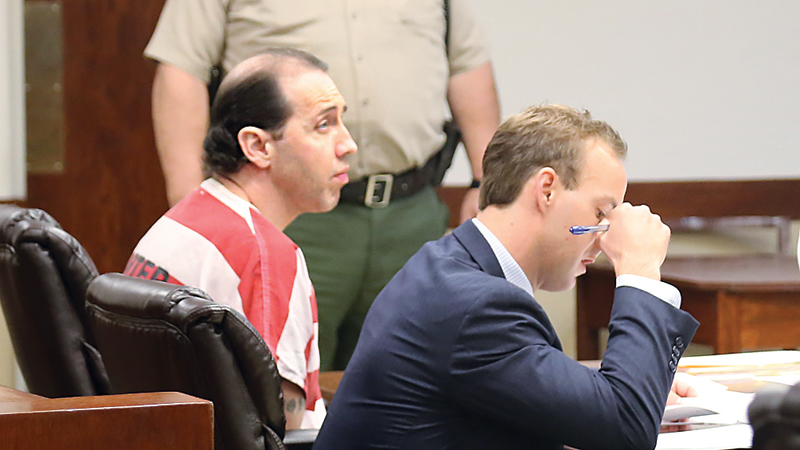Judge denies motion to suppress DNA evidence in murder case
Published 3:50 pm Tuesday, August 14, 2018

- Star Photo/Abby Morris-Frye Chad Benfield, left, sits with his attorney Assistant Public Defender Wesley Taylor during a court hearing on Monday.
A case for a Carter County man charged with murder is now set to proceed to trial after the judge presiding over the case ruled against a motion by the defense to suppress DNA evidence in the case.
Chad Benfield, 44, of Elizabethton, appeared in Carter County Criminal Court on Monday for a court hearing in his case after his attorney, Assistant Public Defender Wesley Taylor, filed a motion asking the court to suppress DNA evidence allegedly linking Benfield to the murder on the grounds the chain of custody on the collected evidence was “legally insufficient.”
Benfield faces murder charges in connection with the July 2017 killing of 89-year-old Mary Nolen inside her Stoney Creek home. The indictment handed down against Benfield by a Carter County Grand Jury in January 2018 charges him with two counts of first-degree murder. The first count of the indictment alleges he killed Mary Nolen “in the perpetration of or attempt to perpetrate rape.” The second count alleges Benfield killed Nolen during the “perpetration of or attempt to perpetrate aggravated burglary.”
Under state law, an individual may be charged with first-degree murder, if someone dies during the perpetration of a felony crime, such as rape or aggravated burglary. This type of murder charge is also called “felony murder” under state law.
The charges against Benfield stem from an investigation by the Carter County Sheriff’s Office into Nolen’s assault and subsequent death which began on July 14 when her granddaughter Melanie Harold found Nolen injured in her home. Nolen later died at the hospital as a result of injuries she suffered in the assault.
Monday’s court hearing centered around some key pieces of evidence in the case against Benfield, specifically DNA samples collected as part of a rape examination performed on Nolen as well as fingernail clippings and scrapings taken from Nolen’s hands.
During the preliminary hearing in the case against Benfield, Carter County Sheriff’s Office Investigator Penny Garland testified it was the fingernail clippings and swabs of the fingers that led investigators to Benfield.
When the Tennessee Bureau of Investigation tested DNA samples collected from the clippings and swabs they ran the DNA profile through the Combined DNA Index System (CODIS) and got a “hit,” Garland said. The test matched the sample collected from Nolan’s nails to a DNA profile in the system belonging to Benfield according to Garland.
Taylor, in his motion, asked the court to suppress the DNA evidence findings and not allow the state to enter them into evidence because of what the defense alleges is an insufficient chain of custody.
Part of the argument listed in the motion questions a gap in time between when samples were collected and when they were entered into records at the Sheriff’s Office.
Much of the testimony in Monday’s hearing dealt with procedural issues regarding how evidence is collected, stored, logged, and transported. The state called seven witnesses during the hearing to establish a chain of custody for the rape examination kit as well as the fingernail clippings and scrapings.
The primary issue raised by Taylor in the motion was a four-day time gap between when the rape kit was collected at the hospital and given to Garland and the time it was logged into the evidence management system at the Sheriff’s Office.
During her testimony on Monday, Garland said she received the rape kit evidence from Sexual Assault Nurse Examiner Tessa Proffitt on a Friday and when she returned to the Sheriff’s Office with the kit it was after hours and the evidence custodian had already gone home. In cases where evidence is brought in after hours, Garland said the Sheriff’s Office utilizes temporary evidence lockers to secure that evidence. Those lockers are equipped with locks to which only the evidence custodian has keys. Garland said she secured the rape kit in one of those lockers and it remained secured there until she and the evidence custodian entered it into the evidence management system early the next week.
At the conclusion of the hearing, Judge Lisa Rice, who is presiding over the case, said she found the state had met the burden of proof in establishing each “link” in the chain of custody for the evidence and that the state had presented “more than sufficient evidence” that the chain of custody was properly maintained.
Rice denied the defense motion to suppress the evidence.
Following the hearing, Rice completed a scheduling order in the case and set Benfield’s trial to begin on January 22 with jury selection to take place on January 17 and 18. The trial is expected to last for several days.





